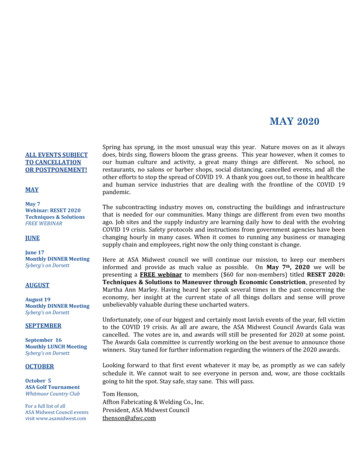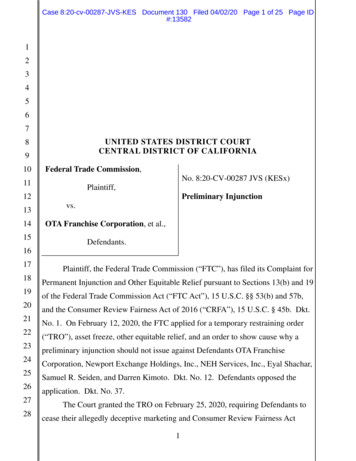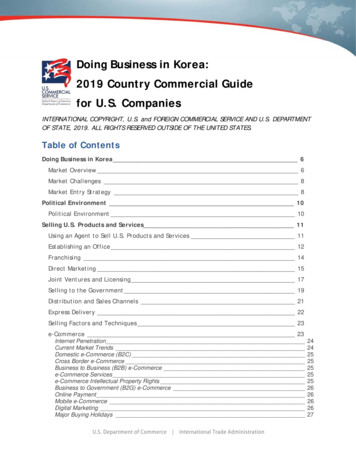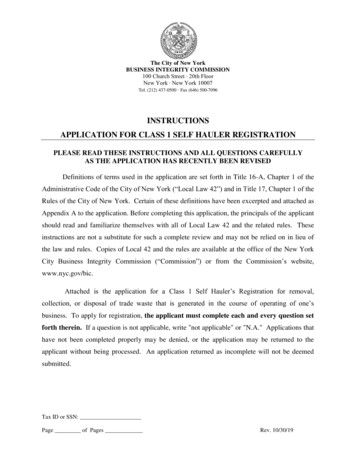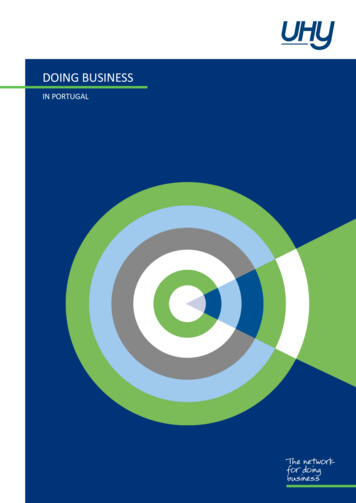
Transcription
DOING BUSINESSIN PORTUGAL
CONTENTS1 – Introduction2 – Business environment3 – Foreign Investment4 – Setting up a Business5 – Labour6 – Taxation7 – Accounting & reporting8 – UHY Representation in Portugal3481013142627
DOING BUSINESS IN PORTUGAL1 – INTRODUCTIONUHY is an international organisation providing accountancy, business management andconsultancy services through financial business centres in around 100 countries worldwide.Business partners work together through the network to conduct transnational operationsfor clients as well as offering specialist knowledge and experience within their own nationalborders. Global specialists in various industry and market sectors are also available forconsultation.This detailed report providing key issues and information for investors considering abusiness operation in Portugal has been provided by the office of UHY’s representativethere:UHY OLIVEIRA, BRANCO & ASSOCIADOS, SROC, LDA.Campo Grande, 28 – 5 A/D1700-093 LisboaPhoneWebsite 351 21 761 33 30www.uhy-portugal.ptYou are welcome to contact António Oliveira (aoliveira@uhy-portugal.pt) with any furtherinquiries you may have.Information in the following pages has been updated so that it is are effective at the dateshown, but inevitably it is both general and subject to change and should be used forguidance only. For specific matters, investors are strongly advised to obtain furtherinformation and take professional advice before making any decisions. This publication iscurrent in April 2022.We look forward to helping you do business in Portugal.UHY OLIVEIRA, BRANCO & ASSOCIADOS, SROC, LDA. is a member of Urbach Hacker YoungInternational Limited, a UK company, and forms part of the international UHY network oflegally independent accounting and consulting firms. UHY is the brand name for the UHYinternational network. The services described herein are provided by the Firm and not byUHY or any other member firm of UHY. Neither UHY nor any member of UHY has anyliability for services provided by other members.3
DOING BUSINESS IN PORTUGAL2 – BUSINESS ENVIRONMENTA republic since 1910, Portugal has been an independent state since 1143. Its continentalfrontiers were established in 1297, making the country one of the oldest nations of Europe.Portugal is situated on the west of the Iberian Peninsula, where the Atlantic meets Europe.Its position on the Atlantic coast early on determined the country’s maritime prowess.In 1415, one of the first of many epic sea voyages made by Portuguese sailors wasrecorded. The Portuguese were the first Europeans to discover the ocean routes to India,Brazil, China and Japan, and at the same time they founded settlements along the east andwest coast of Africa.Portugal faced with the necessity of financial assistance of the European Central Bank, theEuropean Union and the International Monetary Fund (IMF) in April 2011 as a result of thesovereign debt crisis which contributed to the deterioration of access to internationalmarket financing. The program of economic and financial adjustment had come to an endin May 2014.From then on, Portugal entered a sustained path of growth and reduction ofunemployment. After a growth of 1.6% in 2015, the Gross National Product (GNP) hasgrown by 1.5% in 2016 and 2.7% in 2017. These results correspond to a growth rate abovethe European average. Favourable export and investment performance and lowercontraction of domestic demand were determining factors to these results. In 2018 theGNP has grown 2.1% and in 2019 has grown 1.9%.In 2020, the pandemic of COVID-19 stopped the growth of the Portuguese economy. In2020, the Portuguese economy contracted 8.4%, above the European average (-6.4%)reflecting the impact of the pandemic and the more intense decrease in exports of goodsand services than that observed in imports of goods and services.In 2021, GNP grew by 4.9% due to the recovery of private consumption and investmentand the improvement of exports, including the increase in tourism.The forecast for GDP growth in 2022 was 5.8%. However, due to the armed conflictbetween Russia and Ukraine that started on 24th February 2022, the growth forecast wasrevised down to 4.9%.Despite the pandemic situation and the economic consequences of the armed conflictbetween Russia and Ukraine that all countries in the world are going through, Portugal isan exciting country in which to do business today. Firmly anchored in the euro zone,conducting more than 70% of its external trade within Europe and with a stableparliamentary democracy, the country is reinventing itself and creating the right conditionsfor companies to be successful.Portugal is in 39th place in the ranking (among 190 economies) “Ease of doing business” ofthe World Bank Doing Business 2020 report (12th place in EU).4
DOING BUSINESS IN PORTUGALIn 2020, Portugal attracted EUR 5.5 billion in net foreign investment and 10.8 billion in2019 (a reduction of 48.7% compared to the previous year due to the pandemic).Companies like Volkswagen, Visteon, Delphi, Microsoft, Lear, Mitsubishi, Google, amongothers, have chosen to operate in Portugal. The country is home to the headquarters of1,300 multinationals and branches offices of some 3,000 others.Though Portugal is an attractive market for investment, the best way to minimise risks andinvest successfully in Portugal is to seek the advice of appropriate professionals on issueswhich directly relate to your business or investment.THE PORTUGUESE CONSTITUTION AND GOVERNMENTThe 1976 constitution, which was revised in 1982, 1989, 1992, 1997, 2001, 2004 and 2005,established a mixed presidential and parliamentary system, with both the president of theRepublic and the Assembly elected by direct universal suffrage.The president is the head of state, whose function is to monitor and supervise theinstitutions in accordance with the constitution. The government, headed by the primeminister, is responsible for defining policy.The Assembly of the Republic, parliament, is composed of deputies elected in direct andsecret ballots from party lists on the basis of proportional representation. It has a widerange of powers and duties, both political and legislative.The country is divided into 18 administrative districts, which report to the centralgovernment, and 2 autonomous regions, Madeira and the Azores.THE MARKETArea:Population:Working Population:Population density by km2:Official Designation:Capital:District capitals:Language:Currency:92,212 km210,292 million (2020)4,814 million (2020)111.6 (2020)Portuguese RepublicLisbonAveiro, Beja, Braga, Bragança, Castelo Branco, Coimbra,Évora, Faro, Funchal (in Madeira), Guarda, Lisboa, Leiria,Ponta Delgada (in Azores), Portalegre, Porto, Santarém,Setúbal, Viana do Castelo, Vila Real and ViseuPortugueseEuro(Source: National Statistics Institute)THE ECONOMYThe Portuguese economy, with the help of the EU structural funds, and based onappropriate promotion, quality, design and diversification, has evolved in line with themajority of European countries, with the services sector becoming increasingly important.The service sector currently accounts for 69.9% of total employment and 75.8% of GrossValue Added (GVA). Agriculture represents 5.4% of total employment and 2.3% of the GVA.5
DOING BUSINESS IN PORTUGALTABLE 1Employment by sector2020Services:69.9%Industry,Constructionand Energy:24.7%Agriculture,Forestry andFishing: 5.4%Source: National Statistics InstituteIn the last decade, in addition to a greater incidence and diversification of services ineconomic activity, there was also a significant change in the pattern of specialization of themanufacturing industry in Portugal, leaving the dependence on activities of thetraditional sectors to a situation in which new sectors, of greater technologicalincorporation, gained weight and a dynamic of growth, highlighting the automotive andcomponents sector, electronics, energy, the pharmaceutical sector and the industriesrelated to the new information and communication technologies.UNEMPLOYMENTThe unemployment rate in 2018 was 7% and in 2019 it dropped to 6.5%. Due to thepandemic of COVID-19 projections pointed to a significant increase which, however, didnot happen because in 2020 the unemployment rate was 6.8% and in 2021 it was 6.6%.Projections for 2022 point to a reduction to 6%, below the values observed before thepandemic.BANKINGThe banks are very important in the Portuguese economy, contributing to a healthyfinancial dynamism.Banks established in Portugal tend to specialise, following defined strategic options.Examples are the saving banks or banks which specialise in the purchase of real estate.Insurance companies also play a crucial role in the Portuguese system.As a consequence of its membership of the European Union, Portugal today has asignificant level of foreign investment in banking and insurance companies.6
DOING BUSINESS IN PORTUGALSTOCK MARKETSPortugal has two stock markets located in Lisbon and in Oporto.The stock markets provide an open market for leading Portuguese companies, allowingopen market sales of government and corporate bond issues and shares.The stock market also exercises good control over Portuguese companies which mustrespect a strict legal and fiscal reporting regime designed to guarantee the transparency ofaccounts, in order to protect investors.The stock market in Oporto is exclusively for futures and derivatives, highlighting Portugal’sinvolvement in one of the fastest-developing world markets.7
DOING BUSINESS IN PORTUGAL3 – FOREIGN INVESTMENTForeign investment has been increasing in recent times, especially since Portugal became amember of the European Union.The adjustments needed for Portugal to be included in the founding group of countries ofthe European single currency have had a substantial effect on the Portuguese economy.The resulting economic stability has led to increased foreign investment.Greater economic stability, coupled with the potential of the tourism industry, has beendecisive for investment in Portugal.In addition, Portugal’s traditional presence in Africa and Brazil gives it an advantage in theestablishment of commercial contacts and business opportunities in these expandingmarkets.In 2020, the Agency for Investment and Foreign Trade of Portugal won 30 new investmentcontracts representing more than 2,000 jobs.The flows of Foreign Direct Investment in Portugal (FDI), in net terms, registered anamount close to 10.8 billion in 2019, the highest value in recent five years. In 2020, dueto the pandemic that amount dropped to 5.5 billion.The stock of foreign direct investment (FDI) in Portugal has also been growing in the lastyears settling in 149.6 billion Euros in 2020.The top five countries investing in Portugal in 2020 were Netherlands, Spain, Luxembourg,France and United Kingdom, representing 72.8% of the total value. Outside the EuropeanUnion, Switzerland, China, Angola and Brazil close the top ten of the largest foreigninvestors in Portugal.TABLE 3Top inflow FDI investors into Portugal, by country2020Luxembourg:18.2%Others: 20.5%United Kingdom: 6.2%Spain: 20.6%France: 7.0%Brazil: 1.4%China: 1.8%Switzerland: 2.0%Netherlands:20.8%8
DOING BUSINESS IN PORTUGALMajor reasons to invest in Portugal are because the country: Has some of the lowest operational costs in Western Europe. It is located in a geostrategic position between Europe, America and Africa. Gives fast and easy access to the EU single market. It is a founder member of and full participant in the European Monetary Union. Boasts a superb investments track record, with many firms bringing new projects toPortugal. It is home to Europe’s youngest and most enthusiastic workforces, with first-ratetraining facilities. Has high levels of productivity growth in both manufacturing and services. Offers a wide range of sites and buildings at highly competitive prices and ready to use. Offers good domestic logistics and communications infrastructure (is the world's 21thcountry with better infrastructure). Technologically advanced telecommunications infrastructure network. The latestgeneration fibre optic network covers most of the territory (8th EU country in proportionof fibre optic connections in total broadband). Offers high quality support services for investors, both during and after investment. Has one of Europe’s best records for industrial relations. It is known for its social stability. Relevance of the tourism sector, which benefits from Portugal's geographical position,enjoying a Mediterranean climate. In 2019 Portugal was the 20th world market (6th in theEU) in terms of tourism revenue. Has a large network of treaties for the relief of double taxation and many of thePortugal-based companies also benefit from an exemption from corporation tax ondividends that they receive from subsidiaries. Allows residents to enjoy a high quality of life with one of the continent’s lowest crimerates. Positive evolution in the development of start-ups in order to encourage foreign directinvestment and promote the country's attractiveness.9
DOING BUSINESS IN PORTUGAL 104 – SETTING UP A BUSINESSExcluding the acquisition of a Portuguese company, the most common ways of investing inPortugal are to: Set up a company Set up a branch.The most common type of companies in Portugal are the shareholders company (SA) andthe limited liability company (LDA), which have in common the fact that the responsibilityof the shareholders or of the quota-holders is generally limited to their interest in thecapital of the company.There are also other ways of investing in Portugal, for example through joint ventures andpartnerships, although these are less commonly used.SHAREHOLDERS COMPANY (SA)It has a minimum of five shareholders, who can be natural or legal persons. It can beformed with a single shareholder as long as that shareholder is a company.The company must register its start of activity and must also be registered in thecommercial registry.The minimum social capital is EUR 50,000 which can be paid in cash or in kind; in the lattercase, it is necessary to add to the notarial deed, a document from a statutory auditor whichattests to the value of the assets included in the company’s capital.In most cases companies have a structure with a general meeting, a board of directors anda statutory auditor. In certain cases, a single executive can substitute the board ofdirectors.LIMITED LIABILITY COMPANY (LDA)LDAs tend to be smaller companies and usually have lower nominal capital than an SA.The LDA must have at least 2 quota-holders. Nevertheless, it is also possible to set up LDAwith only one quota-holder, termed a Sociedade Unipessoal por Quotas (SUQ).Just like an SA, all LDAs must be registered in the commercial registry before declaring thestart of activity to the tax authorities.The amount of capital is freely fixed by the quota-holders and can be paid on the sameterms as those permitted for the SA.LDA companies must have a general meeting, while management structure can beorganised to suit the company’s requirements.These companies also need a statutory auditor if two of the following three conditions areexceeded over two consecutive years: Total of balance sheet – EUR 1,500,000 Net sales – EUR 3,000,000
DOING BUSINESS IN PORTUGAL 11 Average number of employees in the year – 50.ON THE SPOT FIRMWith the Empresa na Hora (On the Spot Firm) initiative, it is possible to create a company(LDA, SA or SUQ) in just one office (a one-stop office) and in a single day (taking around anhour and a quarter to set up).Interested parties no longer have to obtain in advance a certificate of companyadmissibility from the National Registry of Companies (RNPC). Nor is it necessary anylonger to sign a public deed, except in certain cases.During the incorporation procedure, the definitive legal person identification card will behanded over, the social security number provided, and the company will immediatelyreceive its memorandum and articles of association and an extract of the entry in theCommercial Register.This Empresa na Hora initiative to modernise administration is the first step on the way tosimplifying the relationship between a firm and public administration bodies throughout itslife cycle. Portugal has thus become one country in Europe where setting up a company isnow: Fast, taking an average of 1 hour 14 minutes Less bureaucratic, requiring the completion of just a single form One of the cheapest places, costing about EUR 360.The security of the incorporation procedure for new enterprises is ensured by having allthe details sent to the tax authorities.BRANCHThe branch’s name must be registered on the RNPC (National Registry of CollectivePersons).To set up and register a branch in the Commercial Register, the following documents mustbe presented: The parent company’s incorporation documents The translated by-laws of the parent company A copy of the parent directors board minute attesting to the opening of the branch inPortugal A power of attorney.JOINT VENTURESJOINT VENTURE AGREEMENTThe Portuguese law allows and regulates for this form of companies’ co-operation, which isnormally used for a specific project. Large construction projects frequently use jointventures.The agreement must be written and notarised. It must show the members’ interests andprofit shares, as well as the lead member.
DOING BUSINESS IN PORTUGAL 12EUROPEAN ECONOMIC INTEREST GROUPING (AEIE)Individual or collective members located in EU member states can be associated withunlimited liability.ASSOCIATION OF BUSINESS ENTERPRISESThis is very similar to the AEIE but members must be Portuguese entities and are treatedjust like a company.PARTNERSHIPSPartnerships are rarely used in Portugal, because these involve some partners havingunlimited liability.Nevertheless, liberal professions, such as lawyers, economists, engineers, etc., usepartnerships.Partnerships are normally formed by a deed which should be notarised and which definesthe contribution of each partner and sets out the partnership's by-laws, method of sharingprofits and the admission of new partners.
DOING BUSINESS IN PORTUGAL 135 – LABOURLabour in Portugal is mainly regulated by the Working Code, in force since December 2003,as well as by many collective agreements made between employers and employees’representative organisations.Labour matters have a close connection with social security, which in Portugal is obligatory.It provides cover for sickness and retirement.LABOUR REGIMEGeneral labour contracts do not have to be in writing. However, labour contracts with adefined period must be in written form.Labour contracts with foreigners from outside the EU must always be written and must beregistered with the government.Trial periods vary from 15 days to 240 days, unless the collective agreement defines adifferent period.Term contracts have a maximum period of six years and are only legally allowed if there isa cause which does not justify the creation of a definitive labour contract, such as anunexpected increase of work, the substitution of employees who are temporarily absentwith the right to return to their jobs, etc.Employers can only terminate a labour contract by following the disciplinary proceduresrequired by law.SOCIAL SECURITYAll employees and self-employed persons must be covered by social security, althoughthere are some specific social security schemes for certain activities.Employers must withhold 11% of the gross salary of the employee and they are required topay a further 23.75%. The payment of both parts is the responsibility of the employer.The regime for the self-employed is based on relevant income which is calculated using theincome earned.A self-employed person is responsible for the payment of their own social securitycontribution on the basis of 21.4%.Furthermore, companies or persons that hire self-employed persons will be consideredcontracting entities if they benefit from more than 50% of the total value of their activityand will have to pay a contribution of 7% on the value of the services provided by the selfemployed worker. If they benefit from more than 80% of the total value of their activitythis rate increases to 10%.
DOING BUSINESS IN PORTUGAL 146 – TAXATIONThe taxation of resident companies is regulated by the Corporate Tax Code (IRC), approvedby the Decree-Law 442-B/88 of 30 November 1988 with several amendments; the latestone was introduced by the Law 2/2020 of 31 March 2020.CORPORATE TAXSUBJECTIVE INCIDENCECommercial collective persons, or civil collective persons, and in a general way, allcollective persons which have their head offices in Portugal, collective entities which haveno legal personality, and entities which may or may not have their head office in Portugal,but receive income in Portugal, are subject to corporate tax.OBJECTIVE INCIDENCEResident companies are subject to tax on their world-wide income, while non-residentcompanies are only subject to tax on income from a source in Portugal.TAX DETERMINATIONThe tax is calculated based on the company’s financial statements with adjustmentsimposed by law. This means preparing accounts using the Standard Accounting System(SNC), subject to some corrections mentioned in the IRC Code.Adjustments include the following listed items.DEPRECIATIONDepreciations are regulated by Decree Nº 25/2009 of 14 September; depreciation definesthe useful life of each asset. Beyond this useful life, the depreciation charge will not beconsidered as a taxable cost.The following are also not considered as taxable costs: Land – costs related with its acquisition Private motor vehicles – the cost of a car’s acquisition where the amount exceeded EUR25,000.NON-DOCUMENTED EXPENSESNon-documented expenses are not considered deductible for the calculation of taxableprofit and furthermore are subject to a special stand-alone tax at a rate of 50%.SPECIAL STAND-ALONE TAXExpenses related with private motor-vehicles are also subject to a special stand-alone taxat a rate of 10%. This rate could increase to 27.5% or 35% depending on if the cost ofacquisition of the vehicles exceeds the legal limits (EUR 27,500 and EUR 35,000respectively).Representation expenses are tax-deductible expenses but are subject to a special standalone tax at a rate of 10%.
DOING BUSINESS IN PORTUGAL 15Per-diem allowances and expenses relating to motor-vehicle trips in the service of anemployer are also subject to a special stand-alone tax at a rate of 5%.If a company suffers a tax loss, all the rates of the special stand-alone taxes referred aboveare increased by 10 p.p.CAPITAL GAINSPortuguese law defines capital gains as the difference between the sales proceeds net ofexpenses and the acquisition cost adjusted for depreciation and increased by the officialinflation coefficient; this coefficient is only applied when the seller has held an asset for atleast two years.In the case of land or real estate, the tax authorities have a right to adjust for tax purposesthe value stated by the parties on the notarial deed, according to the official tax valuecalculated according to the rules of the Municipal Property Tax. This will probablyintroduce a natural change in the tax situation of both parts involved in that contract, sincethe seller will have a higher capital gain and the buyer will have to pay more MunicipalProperty Transfer tax.The capital gains obtained by fixed assets disposals are only taxed at half of the value if thesale proceeds are reinvested in fixed assets, during the previous year, the year of the saleor in the two following years. If only part of those proceeds is reinvested, only thepercentage not reinvested will be subject to capital gains taxation. This reinvestmentregime shall not apply to investment property.RESERVESCompanies may deduct provisions for doubtful debts (bad debt), the amount andpercentage depending on the time they are overdue.TABLE 4Deductions depending on months overdueMONTHS OVERDUEEXCEEDING6121824MONTHS OVERDUENOT EXCEEDING121824-DEDUCTIBLE (%)255075100RATESTaxable income is charged at the rate of 21%. Small and medium enterprises are subject toa rate of 17% on the first EUR 25,000 of taxable income. Municipalities may impose anadditional charge of up to 1.5% on taxable income.Non-resident companies, which have no permanent establishment located in Portugal, arein most cases subject to a rate of 25%, which is withheld at source from the income.For companies located in the Azores and Madeira, and whose profits are obtained there,maximum tax rate is 14.7%.
DOING BUSINESS IN PORTUGAL 16PAYMENT OF CORPORATE TAXPayment of this tax is made using a three-payment system during the year, based on theIRC determined for the previous year. These advance payments are made in July,September and until 15 December.If the advanced payments are not enough, the company should pay the difference to thetax due up to the last day of May.RETURNSA company must present a return when it begins its activity in Portugal.Companies must also present annually the income tax return up to the last day of May orin cases where the taxation year does not coincide with the civil year, prior to the last dayof the 5th month after the end of the taxation year.Companies must also present an annual simplified enterprise information (IES) return withaccounting and statistical information up to 15 July or, in the cases where the taxation yeardoes not coincide with the civil year, prior to the 15th day of the seventh month after theend of the taxation year.ENTITIES EXEMPTED FROM CORPORATE INCOME TAXAn automatic exemption applies to the following: The state, autonomous regions (Madeira and the Azores), municipal entities, municipalfederations and associations, social security entities Collective Persons whose objectives are exclusively or predominantly the defence of theenvironment, scientific research, culture, charity, or social solidarity (providing there isexemption recognition).SUBSTANCIAL SHAREHOLDING EXEMPTIONA qualifying company (participation equal or higher than 10% and hold by more than 12months) is not subject to taxation on the dividends paid by the subsidiaries if someconditions are fulfilled.A sale of relevant shares in a subsidiary by a qualifying company can be made tax free ifsome conditions are verified.PERSONAL INCOME TAXSUBJECTIVE INCIDENCETaxpayers are persons who are resident in the Portuguese territory and those who, thoughnot resident, receive income in the country.OBJECTIVE INCIDENCEIncome subject to taxation is classified into the following categories: Income from employment (Category A) Self-employed, industrial or agricultural income (Category B) Investment income (Category E) Property income (Category F) Increase in assets (Category G) Pensions (Category H).
DOING BUSINESS IN PORTUGAL 17RESIDENCEA person is considered a ‘resident’ if they have been in Portugal for at least 183 days, in any12-month period beginning or ending in the year, as well as a person who has been in thecountry fewer than 183 days, but own a house in conditions which suggests the intentionto maintain and occupy as habitual residence.DETERMINATION OF NET INCOMENet taxable income is arrived by adding the income in each category net of any deductionsrelating to each category or allowances.DEDUCTIONS FOR INCOME FROM EMPLOYMENTDeductions include: The amount of EUR 4,104 or social security deductions, if higher Indemnities paid by employee to the employer due to unilateral cessation of a labourcontract without previous notice as a result of a court decision or by agreementobtained in court An indemnity not higher than the basic remuneration corresponding to the previousnotice Quotas paid to trade unions.DEDUCTIONS FROM SELF-EMPLOYMENT INCOME If the taxpayer is required to keep organised accounts, he can make the deductionsallowed by law, which must be registered in his accounts. If the taxpayer is taxed by the simplified scheme, the income obtained is taxed by theapplication of the follow coefficients:o 0.15 – Sales of goods and products and services rendered in connection withhotel activities, food and beverage (except the activity of local accommodation inthe form of dwelling or apartment);o 0.75 – Professional activities specifically provided in the Personal Income TaxCode;o 0.35 – Income of services not covered by previous points;o 0.95 – Royalties, investment income generated by business and professionalactivities, property income, capital gains and other increase in assets;o 0.30 – Subsidies not used in operations;o 0.10 – Subsidies used in operations and other income from self-employment notcovered by previous points;o 0.50 - Activity of local accommodation in the form of dwelling or apartment.INVESTMENT INCOME DEDUCTIONSProfits of companies resident in Portugal or in other EU member state (in the latter case,providing that they fulfil the requirements and conditions of article 2 of Directive90/435/CEE) distributed to resident persons are only taxed on 50% of the income receivedor are subject to a flat rate of 28% (definitive withholding tax).PROPERTY INCOME DEDUCTIONSDocumented repair and maintenance expenses paid by the owner are deductible, as wellas the municipal property tax, the stamp tax and all the costs effectively supported andpaid by the taxpayer to obtain or guarantee property income.
DOING BUSINESS IN PORTUGAL 18INCREASE IN ASSETS INCOME DEDUCTIONSThe only deduction legally possible in this category relates to capital gains, where a gain orloss is only considered at 50% of the gain or loss (except gains with sale of capital shares).PENSIONS INCOME DEDUCTIONSIf the income obtained for each beneficiary in this category is equal or less EUR 4,104, it isdeductible the totality of the pension. If the total income of each beneficiary is higher thanthis amount, the amount deductible is EUR
This detailed report providing key issues and information for investors considering a business operation in Portugal has been provided by the office of UHY's representative there: UHY & ASSOCIADOS, SROC, LDA. Campo Grande, 28 - 5 A/D 1700-093 Lisboa Phone 351 21 761 33 30 Website www.uhy-portugal.pt

